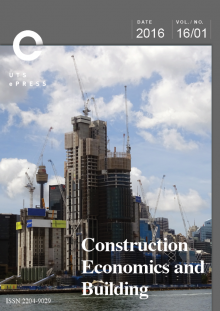On the external validity of construction bidding experiment
Main Article Content
Abstract
The external validity of experimental studies and in particular, the subject pool effects have been much debated among researchers. The common objections are that the use of student as experimental subjects is invalid as they are likely to be unrepresentative. This paper addresses this methodological aspect in building economics research. It compares the bidding behavioural patterns of experienced construction executives (professionals) and student subjects through replication of a bidding experiment that aimed at testing theories. The results show that the student subjects’ bidding behavourial patterns, in terms of decision to bid and mark-up decision, are sufficiently similar to that of the professionals. This suggests that the subject pool per se is not a threat to the external validity of the bidding experiment. In addition, the demonstrated practicality of an experimental approach in testing theories should lead to more use of experimental studies with student subjects in building economics research. It is suggested that experimental and field findings should be seen as complementary in building economics research, as advocated in social sciences.
Article Details
Section
Authors who publish with this journal agree to the following terms:
a) Authors retain copyright and grant the journal right of first publication with the work simultaneously licensed under a Creative Commons Attribution License that allows others to share and adapt the work with an acknowledgement of the work's authorship and initial publication in this journal.
b) Authors are able to enter into separate, additional contractual arrangements for the non-exclusive distribution of the journal's published version of the work (e.g., post it to an institutional repository or publish it in a book), with an acknowledgement of its initial publication in this journal.
c) Authors are permitted and encouraged to post their work online (e.g., in institutional repositories or on their website) prior to and during the submission process, as it can lead to productive exchanges, as well as earlier and greater citation of published work (See The Open Access Citation Advantage Service). Where authors include such a work in an institutional repository or on their website (ie. a copy of a work which has been published in a UTS ePRESS journal, or a pre-print or post-print version of that work), we request that they include a statement that acknowledges the UTS ePRESS publication including the name of the journal, the volume number and a web-link to the journal item.
d) Authors should be aware that the Creative Commons Attribution (CC-BY) License permits readers to share (copy and redistribute the work in any medium or format) and adapt (remix, transform, and build upon the work) for any purpose, even commercially, provided they also give appropriate credit to the work, provide a link to the license, and indicate if changes were made. They may do these things in any reasonable manner, but not in any way that suggests you or your publisher endorses their use.
